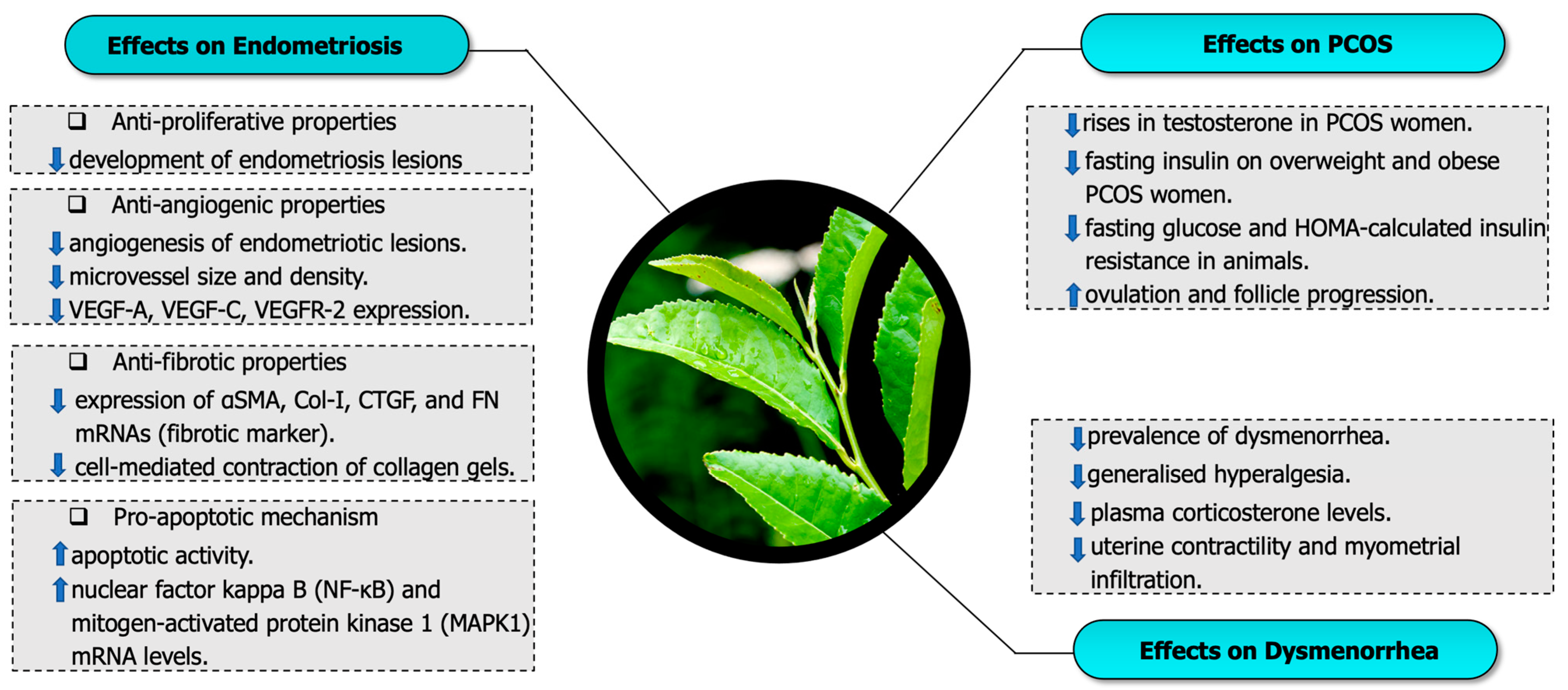Green Tea For PCOS | How To Get The Most Benefit
According to science, green tea is one of the best teas PCOS, or Polycystic Ovary Syndrome. Study after study shows the huge benefits of green tea to help women manage PCOS disease. Some of the benefits of green tea are weight loss, increased fertility, lower testosterone levels, decreased blood glucose levels, and decreased insulin resistance.
Green tea is packed with a wide range of nutrients, including its main active ingredient is an antioxidant called ECGC (Epigallocatechin Gallate). It also has an abundance of a plant-based compound called catechin which contains polyphenols. All of these are essential for helping to reduce the symptoms of PCOS, along with other health benefits.
Currently, many women are struggling with PCOS and are unable to find a suitable solution to manage its symptoms. And some don’t even know that what they are suffering from is PCOS.
After seeing a doctor and following medical advice, many women look for natural ways to help with the symptoms. Drinking medicinal teas for PCOS is where many women seek relief. There are quite a few options of herbal teas that have shown some promise, mainly spearmint tea, ginger tea, root tea, cinnamon tea, chamomile tea, peppermint tea, and dandelion.
But the most researched of all the teas for PCOS is green tea.
You are an active participant in your own journey towards healing and well-being.
What Is Green Tea
The term green tea comes as a result of the natural green color of the leaf and the green tint of the beverage. It’s extracted from Camellia sinensis plant species. Green tea leaves go through the steaming and roasting process before fermentation. The main reason for immediate processes is to prevent the oxidation process which can destroy the medicinal benefits.
Herbal teas are a bit different and green tea is not considered an herbal tea, even though it is a form of an herb. There are differences between green and herbal teas. While green tea is made from the Camellia sinensis plant, herbal teas are made from dried herbs, spices, flowers, or fruits. And herbal tea typically does not have caffeine.
Green tea has caffeine and most herbal teas are caffeine-free. Herbal tea also has lower concentrations of antioxidants than green tea. Plus, the health benefits of herbal teas for PCOS just aren’t as many as green tea.
Get The Full Health Benefits of Green Tea for PCOS
To get the full health benefits of green tea for PCOS, you need to make sure you’re getting enough of it.
In a 2022 study by Reproductive Biology and Endocrinology,
“Significant weight loss in overweight and obese Polycystic Ovary Syndrome women after prescribing 2 capsules of green tea extract 500 mg per day for 12 weeks.”
Another study from the Journal of Nutrition and Food Security was interested in determining the appropriate length of time women needed to take the 1000 mg per day dose, and concluded that,
“Women with Polycystic Ovary Syndrome who took 1000mg for 12 weeks had a significant reduction in weight, fasting insulin, and free testosterone.”
In these studies, the most benefit for PCOS from green tea was after women took 1000 mg/day of the main active ingredient in green tea called EGCG for 12 weeks.
But since the average mug of properly brewed green tea only has about 50-100mg of ECGC, you would need about 10 cups of it a day to get what science has been testing.
This means, you need a good quality green tea extract supplement, if you want to follow the science.
Note: If you have liver problems or other health issues, and before starting any supplement, even green tea, be sure to talk to your doctor first!
Best Supplement For Green Tea for PCOS
To get the most ‘bang for your buck,’ look for a green tea supplement that is made with high quality green tea extract and gives you these proven doses easily. Taking 2 capsules of 500 mg green tea extract helped with weight loss, insulin levels, and free testosterone levels which may improve the symptoms of PCOS.
What Are the Health Benefits of Green Tea for PCOS?
Decrease Androgen Levels
Green tea is essential in balancing hormones and reducing androgen levels for women suffering from PCOS.
High levels of androgen cause the most common symptoms, like irregular periods, hirsutism, acne, anovulation, and hair loss. Androgens are a group of sex hormones. They help start puberty and play a role in reproductive health and body development. All genders make androgens, but males make more of them. Testosterone is the most common androgen.
Studies have shown that green tea reduces testosterone levels and androgen levels, especially after 12 weeks. This means green tea is crucial in managing PCOS, particularly during the androgens-lowering effect.
Improved Insulin Resistance
Green tea is beneficial for women suffering from PCOS because it has a positive effect on blood sugar regulation and insulin insensitivity.
Based on multiple studies, high consumption of green tea plays a significant role in improving insulin insensitivity, decreasing the risk of type 2 diabetes, and reducing blood sugar levels. It contains crucial antioxidants, like EGCG, which is linked to insulin control and blood glucose. Since insulin resistance is thought to be one cause of PCOS, it makes sense that improving insulin insensitivity and managing blood sugars is important. High levels of insulin disrupts other hormones, which causes the ovaries to overproduce male hormones, called androgens.

Weight Loss
Inability to lose weight and weight gain are common characteristics of PCOS due to metabolic dysfunction and hormonal imbalance.
Green tea can increase metabolic rate making it popular for weight management. This is largely thought to be because it has caffeine, high amounts of EGCG, and is low in calories.
It may also be:
- Effective in reducing belly fat, including visceral fat, which is fat around organs
- Appetite suppressant in high doses, especially if you’ve been experiencing uncontrollable hunger and constant cravings
If you’re suffering from PCOS and are trying to meet your fitness goals, green tea may help. Other factors, like stress management, getting enough sleep and regular exercise, plus eating a balanced diet, and focusing on good nutrition are also crucial.
Taking Green Tea for PCOS
Green tea supplements can help with weight loss and controlling the insulin and testosterone levels in women with PCOS. Taking 2 capsules of 500 mg green tea extract for 12 weeks helped with weight loss, insulin levels, and free testosterone levels which may improve the symptoms of PCOS.
Reduces Ovarian Cysts
Originally, the name PCOS came as a result of having multiple cysts on the ovaries. The presence of cysts is a common symptom of the disease. Not all women with it will experience the other symptoms, but all will have ovarian cysts. Some small studies have shown that green tea reduces the number of small cysts.
Anti-Inflammatory Effects
Green tea is rich in catechins (EGCG) which is a type of antioxidant or polyphenol linked to these health benefits. It has strong anti-inflammatory properties and antioxidant properties, which are not only crucial for preventing diseases and managing your overall health but also for managing symptoms of PCOS. Since inflammation increases the severity and progression of it, a diet rich in antioxidants and anti-inflammatory compounds is more effective.
Liver Support
The liver is a crucial organ of the body that’s responsible for various purposes. Some of the functions of the liver include improving digestion, filtration, protein synthesis, detoxification, metabolism, and storage of minerals and vitamins.
Detoxification and hormonal regulation play a key role in managing hormonal health. PCOS patients should support their liver and overall health through lifestyle and dietary changes. In a number of studies, green tea has liver-protecting properties which prevent the accumulation of lipids in your liver.
Although, if you have liver problems, high doses of green tea may exaggerate them. So always talk to your doctor before starting any new supplements.
Gut Health
The gut microbiome, which is normal bacteria that helps us have good skin and healthy bodies, may contribute to PCOS. Green tea is rich in polyphenols which helps improve gut health. According to various studies, polyphenols and antioxidants play a significant role in promoting the growth of microbiota (good bacteria) and decreasing the growth of bad bacteria.

Decrease Stress
Women with PCOS can increase their stress levels. A stress response in our bodies triggers a hormone called cortisol to be produced. This initiates the ‘fight or flight’ stress response. It’s great for survival, but when the level remains high most of the time, we can develop chronic diseases
Cortisol also affects the metabolism of proteins, carbohydrates and fats and increases water retention, and can make us feel euphoria or depression. It raises blood pressure, body temperature, demineralization of the bones and decreases the immune response. And it acts on mood and behavior, appetite and pain perception.
For women with PCOS, cortisol and stress can only increase the pain and discomfort of the disease. But green tea can help. For centuries it has been used to decrease stress, but now there is scientific evidence that it actually lowers cortisol levels and can promote a feeling of wellbeing.
Improved Cholesterol Levels
Women suffering from PCOS tend to have high LDL (bad cholesterol) and high triglycerides (TG). In addition, they often have low HDL (good cholesterol). But green tea can help manage your cholesterol levels and reduce the amount of LDLs.
Reduce Anxiety
Green tea contains a compound known as L-theanine, which plays a significant role in reducing anxiety. This calming effect will give you peace of mind, thus reducing the severity of PCOS symptoms. In addition, green tea contains antioxidants which help reduce stress and anxiety.
Herbal Teas for PCOS
There are some herbal teas that may help PCOS symptoms for some women. But compared to green tea, the benefits aren’t as well studied. Spearmint tea along with root tea types like ginger and licorice root tea may add some benefit.
Spearmint Tea
According to the Journal of Ovarian Research, spearmint and flaxseed have been recommended and used for the treatment of PCOS. Spearmint tea has an anti-androgenic effect, and a significant decrease in testosterone levels was reported following the treatment of PCOS patients with spearmint. Despite previous studies suggesting spearmint tea may be toxic to the reproductive system, this study has disproved that idea.
Ginger Tea
A study published in the International Journal of Reproductive Biomedicine found that using ginger tea as a herbal medicine that didn’t have any side effects at high doses can be an effective and good alternative to clomiphene citrate in improving PCOS.
Licorice Root Tea
Licorice root tea may reduce testosterone levels and also reduce food cravings.
Cinnamon Tea
Cinnamon tea shows some promise in controlling blood sugar levels and reducing insulin resistance. It also tastes great.
Green Teas For PCOS
Green tea supplements can help with weight loss and controlling the insulin and testosterone levels in women with PCOS. Taking 2 capsules of 500 mg green tea extract for 12 weeks helped with weight loss, insulin levels, and free testosterone levels which may improve the symptoms of PCOS.
Matcha green tea has concentrated antioxidants, amino acids, nutrients and vitamins that can help reduce the pain and balance hormones in women with PCOS.
What is PCOS
PCOS is a health problem that affects at least 1 in 10 women, especially during childbearing years. Women suffering from it can have metabolism problems and hormonal imbalances that might affect their physical appearance and overall health. Based on research, PCOS can cause irregular or missed menstrual periods.
Irregular periods can cause the following:
- Development of cysts in your ovaries
- Inability to get pregnant or infertility
PCOS can affect all women and it usually happens between the ages of 15 and 44. You may be at a higher risk of it if you are obese or have a close relative with PCOS. It affects women or all ethnicities and races.
Symptoms of PCOS
PCOS is associated with symptoms mostly tied to high levels of testosterone, including:
- Excessive hair growth called hirsutism
- Irregular menstrual cycles
- Problems with fertility
- Darkening skin and black patches on the face
- Weight gain or difficulty losing weight
- Skin tags
- Hair loss or thinning hair
- Acne
- Production of male hormones, such as testosterone
Causes of PCOS
The exact cause isn’t well understood, however many medical practitioners think that insulin resistance and high levels of androgens and testosterone hormones may contribute to PCOS.
High levels of insulin
Insulin is a hormone released by the pancreas. It plays a significant role in converting food into energy and is released into the bloodstream to move glucose (sugar) from the bloodstream into cells. High levels of sugar floating in the bloodstream is called high blood sugar or high blood glucose. Glucose molecules can damage cells and over time high blood sugar can cause chronic diseases.
Over time, if the body is constantly producing insulin at high levels to respond to high blood sugar levels, it can develop insulin resistance. This is a situation whereby your body’s cells fail to respond the way they should to insulin, which leaves the blood glucose in the blood stream instead of being moved safely inside of cells.
This may result in high levels of insulin in the blood as the pancreas is triggered to keep producing more and more to bring down blood sugar levels. Many women with PCOS also have insulin resistance. This is particularly common for those who are obese.
Unhealthy eating habits and a history of Type 2 Diabetes may increase your risk of insulin resistance. Long term results of insulin resistance may cause Type 2 Diabetes.
High levels of androgens and testosterone
Androgen hormones play a vital role in the development of male traits and initiate puberty.
In all genders, androgens help with:
- Bone density
- Muscle development
- Puberty
- Red blood cell production
- Sexual desire and function
But women with PCOS have higher levels of androgen than normal which causes symptoms of the disease.
How is PCOS Diagnosed
PCOS is diagnosed by your healthcare provider. They will use ultrasound to take a look at your ovaries to see if there are many cysts (fluid-filled sacs) present. And will usually do blood tests that check testosterone and androgen levels.
Health Issues Associated With PCOS
There’s a wide range of severe health issues that are linked to PCOS.
- Sleep apnea
- Obesity
- Type 2 diabetes
- High levels of LDL cholesterol
- Mood disorders, and anxiety and depression
- High blood pressure
- Heart problems
How is PCOS Treated
Treatment for PCOS depends on a number of factors. These may include your age, how severe your symptoms are, and your overall health. The type of treatment may also depend on whether you want to become pregnant in the future.
If you do plan to become pregnant, your treatment may include:
- Changing your diet and exercising more often to encourage your body to use insulin more efficiently
- Medications to cause ovulation, however these may increase the likelihood of having multiple births, like twins and triplets, and can cause bloating and pelvic pain
If you do not plan to become pregnant, your treatment may include:
- Birth control pills to better control menstrual cycles, lower androgen levels, and reduce acne
- Diabetes medication to lower insulin resistance in PCOS. It may also help reduce androgen levels, slow hair growth, and help you ovulate more regularly
- A change in diet and activity. A healthy diet and more physical activity can help you lose weight and reduce your symptoms. They can also help your body use insulin more efficiently, lower blood glucose levels, and may help you ovulate.
- Medications to treat other symptoms. Some medications can help reduce hair growth or acne
Add Green Tea for PCOS To Your Treatment Plan
Adding green tea supplements along with what your doctor recommends. It may help reduce insulin and testosterone levels in women with PCOS. Taking 2 capsules of 500 mg green tea extract for 12 weeks helped with weight loss, insulin levels, and free testosterone levels which may improve the symptoms of PCOS.
Final Thoughts
If you’re suffering from PCOS and are on a treatment plan, try adding green tea for PCOS which may help your symptoms. Studies have shown that taking 1000mg a day for 12 weeks significantly improved the symptoms of PCOS. But, before starting any supplements, always discuss it with your doctor.




